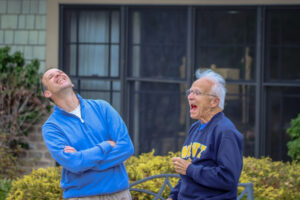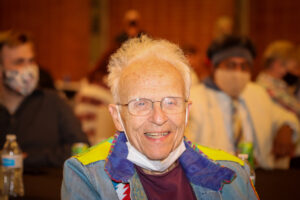
Bob Goodale. If you’ve been around Healing Transitions for awhile, you know his laugh all too well. And if you’re lucky, you’ve heard a few of his stories. We had the absolute gift to hear Bob’s Story of Healing during his 50th year of sobriety, and he exemplifies Recovery Life to a tee. He gives back to Healing Transitions by serving on our Board of Trustees and builds relationships with our staff and participants like no other. He charts the course on living out the promises of recovery: a life that is happy, joyous, and free. Here is his story:
AN AVALANCHE OF MIRACLES
My name is Bob Goodale. I’m in my 90th year, that is, I’m 89, but I’m milking the 90 for two years. I’m on the Board of Trustees. And I’ve served in various roles for 20 years here. My life has been an avalanche of miracles. But let’s start at the beginning.
LIFE BEFORE RECOVERY
This whole addiction thing started at birth. After all, my name is Goodale. When people ask me how to spell it, I tell them, “Like bad beer!” Good Ale. I’m pretty confident in a strong genetic predisposition for my family and myself.
I was born and raised in Iowa, and I graduated high school when I was 17. Five of my buddies and I went camping after graduation, and they grabbed some beer on our way up. I drank a six pack. I blacked out, and I lived every day for the next 21 years in pursuit of that feeling.
I went to Iowa State later that summer and excelled in any number of ways you’d want to measure it. My capacity for alcohol was prodigious. While I was in school, pizza was a fairly new thing. We’re talking about the 50’s here. And this bar had a deal to drink one shot of beer per minute for 60 minutes. Most people puked and couldn’t finish, but I completed the challenge and then finished the night with the pint of Jim Beam in my pocket.
I got married when I was 23, a year after I graduated. By the time I was 30, we had adopted a baby, had a baby, and then adopted another. We were stand-up parents by the world’s standards. President of the PTA, really active in the Episcopal church, all that stuff. I worked in the dairy industry. It worked out fairly well for me because I could hide my alcohol on the job in the milk cartons. Nobody knew just how much I was drinking.
I should have been arrested thousands of times for driving while impaired. And blackouts were just normal. I was quickly becoming physically, spiritually, and emotionally bankrupt. My addiction kept getting worse and worse. The world saw Dad-of-the-Year, a super successful businessman taking his family to church every weekend, but my body and soul were dying quickly.
I went to the doctor, and he said I had heart trouble. Newsflash: I didn’t have a heart problem. I had a drinking problem.
Later that year, my wife Jane and I went up to the boundary waters canoe area to make a circuit for a couple weeks. It’s beautiful, out in the middle of nowhere. A couple days into the trip, I realized I didn’t have any booze with me. My urine started to be a little pink. And then it gradually got darker.
I didn’t say anything to Jane until it was obvious I was leaking blood.
That night, a bear got up in the tree where we were hanging our packs and I can hear all of our stuff tumbling to the ground as he sifted through it. Normally, I’d go outside and scare the bear off. But our camping site was on a peninsula – completely surrounded by water – and my body was shutting down. It was super stressful, and we were terrified. When we walked out of our tent in the morning, all of our food was gone. We were at least a two-to-three-day trip out from our car.
We made it back, and Jane drove me straight to the hospital. I was bleeding esophageally, which is a really bad sign, and had blood in the stool. I was so scared. I remember one of my doctors asked me how much I drank, and of course I lied, but nobody ever intervened. It was still a secret I was keeping. They kept treating me for a heart condition. But it wasn’t a heart condition – it was a drinking condition.
By this time, I was off the rails. My moral compass was spinning with no true north. Something was deeply unsettled with my life in addiction, and I needed to let someone in. Of course, my grandiosity brought me to the bishop instead of the parish priest.
I told him that there were two things that I was having trouble with: my marriage and that I couldn’t drink like other people. I wasn’t able to acknowledge that I drank too much at this point, I just knew alcohol affected me differently. Of course, this conversation occurred over three martinis apiece. We agreed we’d work on the marriage first.
In January, 1972, one of my closest friends died. Because he had a cold, his heart surgery was postponed, and he died on his sofa. It was jarring for me. I think you can tell from my story so far that I was a pretty laid back guy. My mantra was, “Well, so what?” I just remember I pounded the walls and tried to beat them down. It really shook me.
In February, just a month after his death, I ran the car off the road. The field I landed in caught on fire, and in a moment I was surrounded by flames. I don’t know how I got out. The next morning, I called the bishop and told him it was time to work on the booze problem. He told me about a new treatment center in Omaha and called to let them know I was on my way.
FEBRUARY 18, 1972
I was 38 years old when I drove to the treatment center in Omaha. I stopped drinking on February 18, 1972. It was a 28-day program, which was pretty common, but they kept me for 42 days. I was the seventh graduate of the program. The bishop was the forty-sixth.
This year will mark 51 years of sobriety. And I have kept track of every single month, I can’t help myself. I mean, this is unreal. It’s just a bunch of miracles. It’s been an avalanche of miracles.
We talk a lot about doing 90 days. I’ve done 90 days 200-and-some times. Nobody gets sober right away. My misconception when I left treatment was that everything was going to be okay now that I wasn’t drinking anymore.
So I started catching up with those who were most important to me. I came to understand that success isn’t about power and money. I always say that I missed the decade of the sixties, and now we’re in 2023. I’ve had the privilege of recovering a lot of relationships, emotions, and my life since 1972.
THE REAL DEAL: EMOTIONAL SOBRIETY
The really important message is that I worked only a two step program for a long time, thinking that recovery was about not drinking. And it’s not about that. Healing is about becoming emotionally sober. And you only do that by working a program of recovery. That’s the real deal.
You can white knuckle it or whatever you want to call it. You can choose to just stop, but the problem with my life was me, not the drinking. And recognizing that is what it means to live out recovery and go beyond a two-step program.
So what’s life like in recovery? Recognizing that I am wildly imperfect. But I’m also happy, joyous, and free. Those are the promises of recovery. I’ve added ‘wildly imperfect,’ that’s been my deal as I’ve come to terms with living authentically.
I’ve been free for a long time to claim being wildly imperfect.
Love brought me through to recovery. And it has everything to do with relationships. Recognizing my own wild imperfections and seeing that others are also imperfect keeps me out of the business of being judgmental. It’s been 51 years of living happy, joyous, and free. And I’ve gotten to see so many also embrace emotional sobriety at Healing Transitions. This place holds such unbelievable power. The miracles are just pouring at you.
